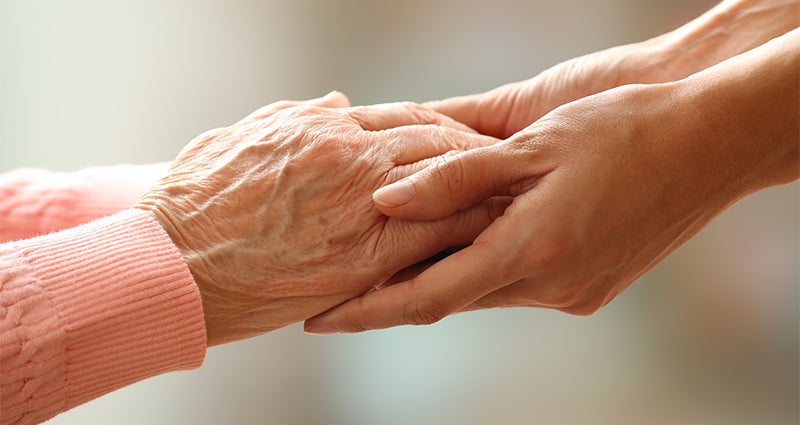Covid-19 has exposed the fragilities of aging countries
An IEG report focuses on much needed areas of attention.
An IEG report focuses on much needed areas of attention.
By: Elena BardasiGisela M. Garcia
Over two million people have died to date as a result of the global COVID-19 pandemic. While no country has escaped the virus unharmed, countries like Italy and Spain—where the elderly form a relatively large share of the population—have been hit hardest. Older men and women who might otherwise be enjoying their retirement and doting on their grandchildren are instead dying in nursing homes, suffering COVID-related complications heightened by pre-existing risk factors and co-morbidities, and enduring isolation from their families and daily routines. Alongside many other fragilities, the pandemic has ruthlessly uncovered specific challenges that aging societies face, as well as potential directions for change. The IEG evaluation of World Bank Support to Aging Countries offers lessons that speak to some of these challenges.
Lesson # 1: Health systems in aging countries need to be prepared for the specific health care needs related to changes in their population’s age structure and chronic disease profile. The evaluation finds that the World Bank helped client countries adapt their health systems to various changes in demographic patterns through projects that aim to strengthen primary health care. However, much work still needs to be done when it comes to addressing the specific needs of elderly populations and strengthening public health programs and health promotion and prevention policies that incentivize healthy behaviors for a healthier old age.
Too many health systems still fail to invest adequately and effectively in measures that would prevent and manage risks factors such as obesity, high blood pressure and diabetes that increase with age and that have been associated with increased severity of illness and death from COVID-19. More emphasis on prevention, promotion of healthy behaviors, and increased use and access to primary care would help people age healthier and address these conditions when they’re younger, which would make them less vulnerable as they age, keep them out of hospitals (or hospitalized for shorter periods of time), decrease their exposure to infectious diseases like COVID-19 and improve their overall wellbeing.

Lesson # 2: COVID-19 exposed multiple weaknesses of facility-based long-term care, as well as the risks of relying mostly on women as unpaid care providers, and calls for improved approaches that the Bank needs to internalize. The evaluation notes that aging countries need to start planning for the rapidly increasing care needs of their population. Older people have specific social vulnerabilities and care needs that, depending on their living conditions, may be intensified by COVID-19 and require special attention from caregivers. The unavoidable physical distancing measures mandated by the pandemic exacerbate loneliness and other mental health challenges that are unique or disproportionate among the elderly.
COVID-19 also poses immense challenges for residential long-term care facilities. These institutions were never intended to provide care or treatment for highly infectious diseases, and many became incubators of infection early in the pandemic. They require ongoing support to acquire and deploy appropriate equipment (including personal protective gear), vaccines, staff training, and capacity to properly isolate and care for infected residents. Also, they should comply with stringent rules to make sure residents’ health risks do not increase as a result of their living arrangements. Long-term care is a relatively new line of work for the World Bank, a complex area that requires strategic planning, support to governments to enact and enforce strict regulations, staff formation, and cultural sensitivity. COVID-19 provides important lessons that the Bank should integrate in its approach as it evolves.
Increasing long-term care needs also calls into questions social norms that typically identify women as unpaid care providers. The pandemic disproportionately impacts women as caregivers. Prior to COVID-19, women were highly overrepresented among those who provide both paid and unpaid care for children, sick and older adults. With school closures forcing many families into unexpected round-the-clock childcare and home-schooling tasks, as well as increased needs for elder and sick care, women’s hours spent on unpaid labor are increasing worldwide. Many have already had to exit the paid labor force as a result. As experts in the Bank, UN, academia, and global advocates for women and girls have so eloquently highlighted, one of the starkest long-term consequences of the pandemic may be the stalling or reversal of hard-won progress on gender equality.
Lesson # 3: The COVID-19 pandemic further highlights the importance of investing in data for better preparedness—and the potential critical role of the World Bank in this area. COVID-19 has revealed significant holes and inconsistencies in the available information on aging adults’ experiences during the pandemic. Data on the pandemic’s social and economic effects, impact on mental health, and behavioral data on older populations’ compliance and coping with physical distancing requirements are not always disaggregated by age and gender to allow for assessing specific impacts and patterns related to older adults.
Data gaps are especially pronounced in relation to long-term care facilities. For a variety of reasons, many COVID-19 deaths in care homes have gone unreported. Key data collection efforts would need to focus on long-term care facilities’ infection control and preparedness efforts before, during, and after the pandemic, including patterns of physical access and staffing, availability and accuracy of coronavirus testing, communications with residents and families, and interactions with health and regulatory authorities.
The forthcoming IEG evaluation highlights important gaps in available data on the health and overall well-being of older people, especially in developing countries. The evidence on the links between aging and health is especially thin on: (i) the determinants of healthy aging; (ii) the evolution of health and functionality as people age; (iii) the changes in health inequalities among older adults over time and across and within countries; and (iv) the needs and preferences of older adults regarding health care and long-term care services. More granular and specialized data are needed on disability, functional dependency, cognitive status, mental health, and use of health care services. The World Bank has a role to play to improve collection, standardization, access, and use of these data to support countries to better plan for population aging, including responding to health emergencies like the current pandemic.



Judy Twigg is a professor of political science at Virginia Commonwealth University. She is also a senior associate with the Global Health Policy Center of the Center for Strategic and International Studies; consultant for the Independent Evaluation Group of the World Bank, Office of Evaluation and Oversight of the Inter-American Development Bank, and Independent Evaluation Department of the Asian Development Bank; adjunct professor at the Center for Eurasian, Russian and East European Studies at Georgetown University; and member of the board of trustees of the Eurasia Foundation.
Add new comment